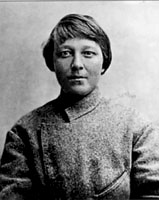Maria Nikiforova | |
|---|---|
Марія Нікіфорова | |
 Nikiforova.Its origin unclear, this photo is believed to have been taken in Yelysavethrad (c. 1918).[1] | |
| Deputy leader of the Oleksandrivsk Revolutionary committee | |
| In office 4 January 1918 – 18 April 1918 | |
| Preceded by | Position established |
| Succeeded by | Position disestablished |
| Personal details | |
| Born | 1885 Oleksandrivsk, Katerynoslav, Russian Empire |
| Died | 16 September 1919 (aged 33–34) Sevastopol, Taurida, South Russia |
| Cause of death | Execution by firing squad |
| Nationality | Ukrainian |
| Spouse | Witold Brzostek |
| Nickname | Marusya (Ukrainian: Маруся) |
| Military service | |
| Allegiance | |
| Branch/service |
|
| Years of service | 1914–1919 |
| Rank | Atamansha |
| Commands |
|
| Battles/wars | |
Maria Hryhorivna Nikiforova (Ukrainian: Марія Григорівна Нікіфорова; 1885–1919) was a Ukrainian anarchist partisan leader who led the Black Guards during the Ukrainian War of Independence, becoming widely renowned as an atamansha. A self-described terrorist from the age of 16, she was imprisoned for her activities in Russia before managing to escape to western Europe. With the outbreak of World War I, she took up the defencist line and joined the French Foreign Legion on the Macedonian front before returning to Ukraine with the outbreak of the 1917 Revolution.
In her home city of Oleksandrivsk (today Zaporizhzhia), she established an anarchist combat detachment and subsequently attacked the forces of the Russian Provisional Government and the Ukrainian People's Republic. After the October Revolution escalated into a civil war, she joined the side of the Ukrainian Soviet Republic, leading her druzhina in capturing Taurida and Yelysavethrad (today Kropyvnytskyi) from the Ukrainian People's Army.
When Ukraine was invaded by the Central Powers, she was forced to flee to Russia, where she was prosecuted for insubordination by the nascent Bolshevik government. When she returned to Ukraine, she briefly participated in the civilian activities of the Makhnovshchina before returning to terrorism. She aimed to assassinate the leaders of the White movement (Anton Denikin and Alexander Kolchak) but was caught and executed.
- ^ Archibald 2007, p. 44.